
"Tell It Like It Is" is a song written by George Davis and Lee Diamond and originally recorded and released in 1966 by Aaron Neville. In 2010, the song was ranked No. 391 on Rolling Stone magazine's list of The 500 Greatest Songs of All Time.

"Only Women Bleed" is a song by American rock singer Alice Cooper, released on his debut solo studio album Welcome to My Nightmare (1975). It was written by Cooper and Dick Wagner and was the second single from the album to be released.

"Tell Me a Lie" is a song composed by Mickey Buckins and Barbara Wyrick. Originally recorded by Lynn Anderson for her 1974 What a Man My Man Is album, it was released later that same year as a single by Sami Jo Cole, who took it to number 21 on both of the major U.S. pop charts. It also charted in Canada (#17). Cole's version was also an Adult Contemporary hit, reaching number 14 in the U.S. and number 27 in Canada.
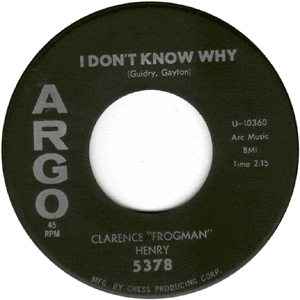
"(I Don't Know Why) But I Do" is an R&B song written by Paul Gayten and Bobby Charles, and performed by Clarence "Frogman" Henry.

"Still" is a 1979 song by the soul music group the Commodores. It was released as a single on Motown Records with "Such a Woman" as the B-side. The song appears on their 1979 hit album Midnight Magic. This was their last No. 1 hit in the country.

"This Masquerade" is a song written by American singer and musician Leon Russell. It was originally recorded in 1972 by Russell for his album Carney and as a B-side for the album's hit single "Tight Rope". The song was then covered on Helen Reddy's 1972 album, I Am Woman. It was then recorded by American vocal duo, the Carpenters, for their 1973 album Now & Then and as the B-side of the Carpenters's single "Please Mr. Postman". Three years later, "This Masquerade" was recorded by American singer and guitarist George Benson, who released it on his 1976 album, Breezin'. Benson's version, featuring Jorge Dalto on piano, was released as a single and became the first big hit of his career.
"Hair" is the title song to the 1967 musical Hair and the 1979 film adaptation of the musical.

"Lonely Night (Angel Face)" is a song written by Neil Sedaka. The song was first recorded by Sedaka and appeared as a track on his 1975 studio album, The Hungry Years. The following year the song was made popular when covered by the pop music duo Captain & Tennille, who took their version to number 3 on the Billboard Hot 100.

"Love Ballad" is a song by R&B/Funk band L.T.D. Jeffrey Osborne is the lead singer.

"Never My Love" is a pop standard written by American siblings Don and Dick Addrisi, and best known from a hit 1967 recording by the Association. The Addrisi Brothers had two Top 40 hits as recording artists, but their biggest success as songwriters was "Never My Love". Recorded by dozens of notable artists in the decades since, in 1999 the music publishing rights organization Broadcast Music, Inc. (BMI) announced it was the second most-played song on radio and television of the 20th century in the U.S.
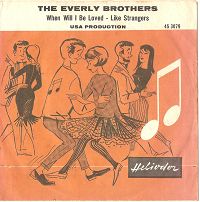
"When Will I Be Loved" is a popular song written by Phil Everly of the Everly Brothers, who had a US top-ten hit with it in 1960. Linda Ronstadt covered the song in 1975, and her version was an even bigger hit in the US, peaking at No. 2. Vince Gill also covered it in 1994 on the soundtrack of the film 8 Seconds.
"Without Love (There is Nothing)" is a song written by Danny Small and originally recorded by Clyde McPhatter in 1957. McPhatter's version peaked at number six on the R&B Best Seller chart and number nineteen on Billboard Hot 100.

"Gypsy Woman" is a 1961 rhythm and blues song written by Curtis Mayfield and recorded by his group the Impressions. The group's first single following the departure of lead singer Jerry Butler, it reached No. 2 on the US Billboard R&B chart, No. 20 on the Billboard Hot 100 and number 17 on the Cash Box chart. It also appeared on the group's 1963 eponymous debut album. Joe Bataan (1967), Brian Hyland (1970), Bobby Womack (1985), and Santana (1990) covered this song.

"Never Ending Song of Love" is a song written by Delaney Bramlett, and, according to some sources, by his wife Bonnie Bramlett. It was originally recorded with their band, Delaney & Bonnie & Friends, in 1971 on the album Motel Shot. Released as a single by Atco Records the same year, "Never Ending Song of Love" became Delaney & Bonnie's greatest hit on the pop charts, reaching a peak of No. 13 on the Billboard Hot 100 and No. 8 on Easy Listening. It reached No. 16 in Australia.
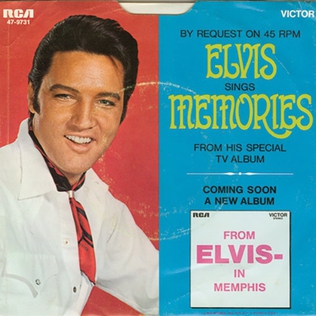
"Memories" is a 1968 song originally recorded by Elvis Presley.
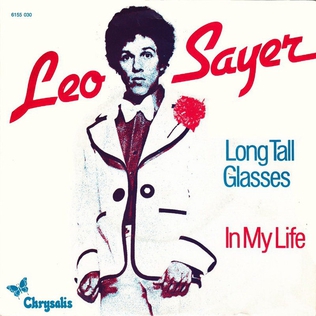
"Long Tall Glasses (I Can Dance)" is a 1974 song by Leo Sayer, co-written with David Courtney. It was released in the United Kingdom in late 1974, becoming Sayer's third hit record on both the British and Irish singles charts and reaching number four in both nations. It was included on Sayer's album Just a Boy.

"Keep Your Eye on the Sparrow", also known as "Baretta's Theme", is a song written by Morgan Ames and Dave Grusin, recorded by multiple artists during the summer of 1975. Merry Clayton's version was the first to chart, reaching #45 on the U.S. Billboard Hot 100.

"Soul Deep" is a song originally recorded by Robbie Lane and the Disciples in 1966, but best known by a recorded version by The Box Tops. It was the third of three singles released from their 1969 Dimensions LP. Lead vocals were provided by Alex Chilton.

"Don't Throw It All Away" is a song written by British musician Gary Benson and first released by the Shadows on their 1975 album Specs Appeal. Benson released his version as a single later the same year, which reached number 20 on the UK Singles Chart in the fall of 1975.
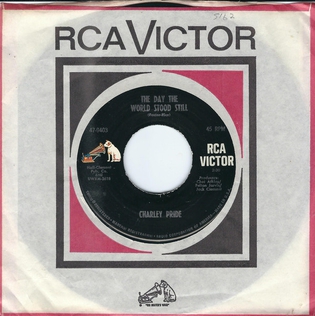
"The Day the World Stood Still" is a song written by Jerry Foster and Bill Rice, and recorded by American country music artist Charley Pride. It was released in December 1967 as the second single from the album The Country Way. The song was Pride's sixth single and his fourth major hit as a recording artist.


















